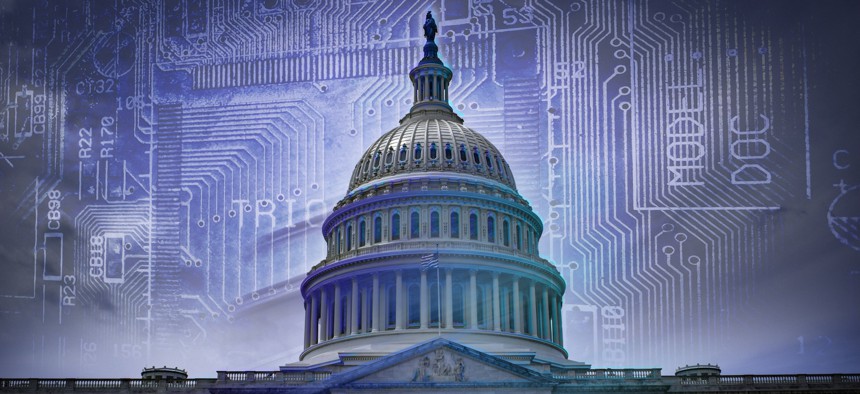
Greggory DiSalvo/Getty Images
Lawmakers eye 2025 defense bill for AI proposals
A leader of the Senate’s bipartisan AI working group said that next year's must-pass defense policy bill could include some substantive AI proposals, but the Senate is “not ready” for a comprehensive AI bill at this time.
Artificial intelligence legislation and funding proposals may need to be included in the fiscal year 2025 National Defense Authorization Act if the United States wants to continue maintaining a technological advantage over global adversaries like China, lawmakers said during a discussion at the Ronald Reagan Institute’s National Security Innovation Base Summit on Wednesday.
Sen Todd Young, R-Ind. — a member of the bipartisan working group established by Senate Majority Leader Chuck Schumer, D-N.Y., last year to examine the possibilities and threats of AI technologies — said his goal in the next couple of months is “to begin legislating in this space” and pointed to the must-pass defense policy package as an opportunity to address some of these early issues.
“It would be absolutely merited to include [AI proposals] with the NDAA because I think it's broadly recognized the extent to which the United States can remain ahead in artificial intelligence, research, development, commercialization,” Young said, adding that “there will be sort of dual use and spillover benefits — sometimes direct benefits — to the Pentagon.”
Young said the Senate is “not ready” for a comprehensive AI bill at this time, but lawmakers still “want to make sure that some of the risks that, frankly, industry is most concerned about can be addressed.”
Young made similar comments during a conversation with Sen. Mark Warner, D-Va., that was hosted by Punchbowl News last month. During the February event, Young said he — along with Sen. Mike Rounds, R-S.D., another member of the Senate’s bipartisan working group — had approached every ranking member of a major committee in the upper chamber to let them know they were about to “produce our lessons learned” so that the committees could begin to advance and mark up AI proposals.
Young on Wednesday once again reiterated the importance of working through “the committees of jurisdiction” to move forward any AI proposals, but added “that doesn't mean extensive legislating, that means adapting our existing laws and standards to an AI-enabled world.”
He said lawmakers will most likely need to authorize more funding — or reallocate existing funds — to drive broader acceptance and use of AI tools, including more dollars going toward research and education on how to use the emerging technologies.
Rep. Adam Smith, D-Wash. — the ranking member of the House Armed Services Committee who participated in Wednesday’s discussion with Young — also called the NDAA “an opportunity” to pass other legislation and address education-related gaps when it comes to AI.
Smith said this process should also include a focus on recruiting and retaining more high-tech personnel to the Department of Defense, but he warned that “there are a number of impediments” that are already slowing down this talent pipeline.
“The whole security clearance issue — and classified information, and what we're doing and how we're making it far more difficult for people to work for the government than it should be — is a major problem,” Smith said, adding that “we need to bring them in if we're gonna get to where we need to be on the innovation that we need.”
Beyond the need to bolster the Pentagon’s pool of skilled personnel, Young also cited the broader national implications of the U.S. establishing its own “coherent legal framework — maybe one that's slightly better than the Europeans and the Japanese who have moved first — then we can try and harmonize our regulations with allies across international boundaries.”
This type of global regulatory push, he said, would help to ensure that China’s efforts to develop AI technologies are governed by standards that address U.S. and allies’ concerns “about biases against certain racial and ethnic groups [and] our concerns about privacy implications of their monitoring technologies.”
Young was one of the senators leading the advancement of the CHIPS and Science Act — which has allocated billions of dollars to help boost domestic chip manufacturing — and said the effort to set standards and harmonize regulations “is analogous to what we have done on semiconductors.”
“As you set the rules of the road, you invite the Chinese to make a decision,” Young said. “Either they're going to comply by our tech standards, or they're just going to have to spend exorbitant amounts within their own domestic economy and with this couple of vassal states to sell into a much more limited market.”







